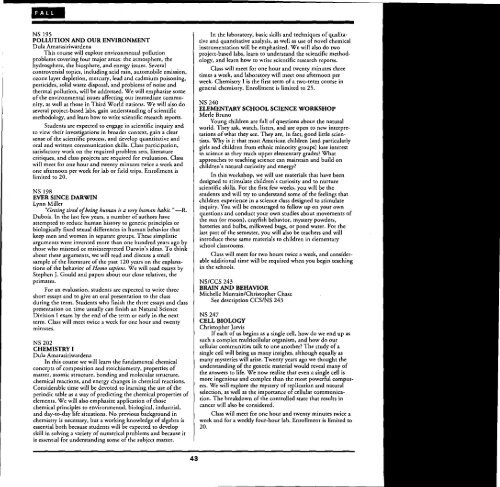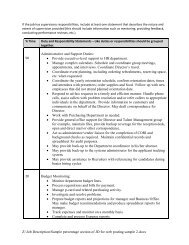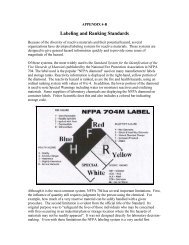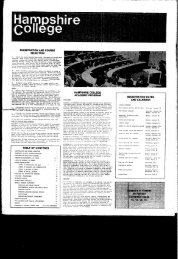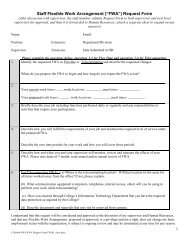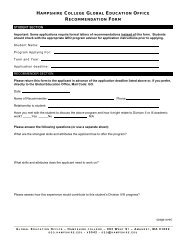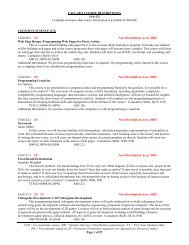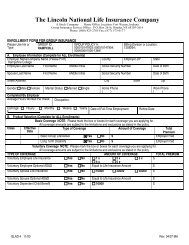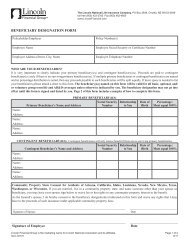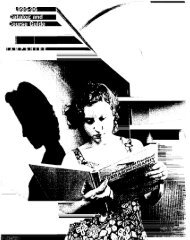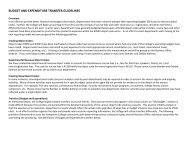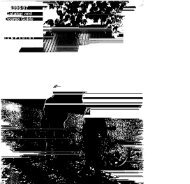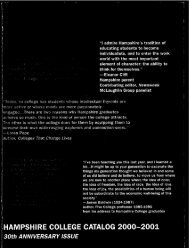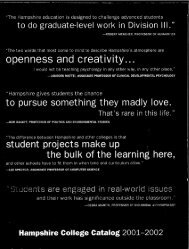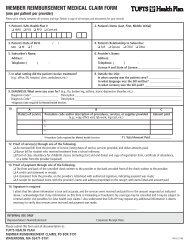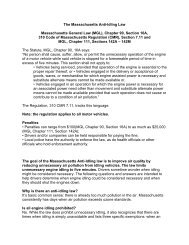school of social science - Hampshire College
school of social science - Hampshire College
school of social science - Hampshire College
Create successful ePaper yourself
Turn your PDF publications into a flip-book with our unique Google optimized e-Paper software.
NS 195<br />
POLLUTION AND OUR ENVIRONMENT<br />
Dula Amarasiriwardena<br />
This course will explore environmental pollution<br />
problems covering four major areas: the atmosphere. the<br />
hydrosphere, the biosphere. and energy issues. Several<br />
controversial topics, including acid rain, automobile emission,<br />
ozone layer depletion, mercury. lead and cadmium poisoning,<br />
pesticides. solid waste disposal, and problems <strong>of</strong> noise and<br />
thermal pollution. will be addressed. We will emphasize some<br />
<strong>of</strong> the environmental issues affecting our immediate community.<br />
as well as those in Third World nations. We will also do<br />
several project-based labs, gain understanding <strong>of</strong> scientific<br />
methodology, and learn how to write scientific research reports,<br />
Students are expected to engage in scientific inquiry and<br />
to view their investigations in broader context, gain a clear<br />
sense <strong>of</strong> the scientific process, and develop quantitative and<br />
oral and written communication skills. Class participation,<br />
satisfactory work on the required problem sets, literature<br />
critiques, and class projects are required for evaluation. Class<br />
will meet for one hour and twenty minutes twice a week and<br />
one afternoon per week for lab or field trips. Enrollment is<br />
limited to 20.<br />
NS 198<br />
EVER SINCE DARWIN<br />
Lynn Miller<br />
"Getting tired <strong>of</strong> being human is a very human habit. " -R.<br />
Dubois. In the last few years, a number <strong>of</strong> authors have<br />
attempted to reduce human history to genetic principles or<br />
biologically fixed sexual differences in human behavior that<br />
keep men and women in separate groups. These simplistic<br />
arguments were invented more than one hundred years ago by<br />
those who misread or misinterpreted Darwin's ideas. To think·<br />
about these arguments, we will read and discuss a small<br />
sample <strong>of</strong> the literature <strong>of</strong> the past 120 years on the explanations<br />
<strong>of</strong> the behavior <strong>of</strong> Homo sapiens. We will read essays by<br />
Stephen J. Gould and papers about our close relatives, the<br />
primates.<br />
For an evaluation, students are expected to write three<br />
short essays and to give an oral presentation to the class<br />
during the term. Students who finish the three essays and class<br />
presentation on time usually can finish an Natural Science<br />
Division I exam by the end <strong>of</strong> the term or early in the next<br />
term. Class will meet twice a week for one hour and twenty<br />
minutes.<br />
NS 202<br />
CHEMISTRY I<br />
Dula Amarasiriwardena<br />
In this course we will learn the fundamental chemical<br />
concepts <strong>of</strong> composition and stoichiometry, properties <strong>of</strong><br />
matter I atomic structure. bonding and molecular structure,<br />
chemical reactions, and energy changes in chemical reactions.<br />
Considerable time will be devoted to learning the use <strong>of</strong> the<br />
periodic table as a way <strong>of</strong> predicting the chemical properties <strong>of</strong><br />
elements. We will also emphasize application <strong>of</strong> those<br />
chemical principles to environmemal, biological, industrial,<br />
and day-to-day life situations. No previous background in<br />
chemistry is necessary, but a working knowledge <strong>of</strong> algebra is<br />
essential both because students will be expected to develop<br />
skill in solving a variety <strong>of</strong> numerical problems and because it<br />
is essential for understanding some <strong>of</strong> the subject matter.<br />
43<br />
In the laboratory, basic skills and techniques <strong>of</strong> qualitative<br />
and quantitative analysis, as well as use <strong>of</strong> novel chemical<br />
instrumentation will be emphasized. We will also do twO<br />
project-based labs. learn to understand the scientific methodology,<br />
and learn how to write scientific research reports.<br />
Class will meet for one hour and twenty minutes three<br />
times a week, and laboratory will meet one afternoon per<br />
week. Chemistry I is the first term <strong>of</strong> a two-term course in<br />
general chemistry. Enrollment is limited to 25.<br />
NS 240<br />
ELEMENTARY SCHOOL SCIENCE WORKSHOP<br />
Merle Bruno<br />
Young children are full <strong>of</strong> questions about the natural<br />
world. They ask. watch, listen, and are open to new interpretations<br />
<strong>of</strong> what they see. They are. in fact. good little scientists.<br />
Why is it that most American children (and particularly<br />
girls and children from ethnic minority groups) lose interest<br />
in <strong>science</strong> as they reach upper elementary grades? What<br />
approaches to teaching <strong>science</strong> can maintain and build on<br />
children's natural curiosity and energy?<br />
In this workshop, we will use materials that have been<br />
designed to stimulate children's curiosity and to nurture<br />
scientific skills. For the first few weeks, you will be the<br />
students and will try [0 understand some <strong>of</strong> the feelings that<br />
children experience in a <strong>science</strong> class designed to stimulate<br />
inquiry. You will be encouraged to follow up on your own<br />
questions and conduct your own studies about movements <strong>of</strong><br />
the sun (or moon), crayfish behavior, mystery powders,<br />
batteries and bulbs, milkweed bugs, or pond water. For the<br />
last part <strong>of</strong> the semester, you will also be teachers and will<br />
introduce these same materials [0 children in elementary<br />
<strong>school</strong> classrooms.<br />
Class will meet for two hours twice a week. and considerable<br />
additional time will be required when you begin teaching<br />
in the <strong>school</strong>s.<br />
NS/CCS 243<br />
BRAIN AND BEHAVIOR<br />
Michelle Murrain/Christopher Chase<br />
See description CCS/NS 243<br />
NS 247<br />
CELL BIOLOGY<br />
Christopher Jarvis<br />
If each <strong>of</strong> us begins as a single cell, how do we end up as<br />
such a complex multicellular organism, and how do our<br />
cellular communities talk to one another? The study <strong>of</strong> a<br />
single cell will bring us many insights, although equally as<br />
many mysteries will arise. Twenty years ago we thought the<br />
understanding <strong>of</strong> the genetic material would reveal many <strong>of</strong><br />
the answers to life. We now realize that even a single cell is<br />
more ingenious and complex than the most powerful computers.<br />
We will explore the mystery <strong>of</strong> replication and namral<br />
selection. as well as the importance <strong>of</strong> cellular communication.<br />
The breakdown <strong>of</strong> the controlled state that results in<br />
cancer will also be considered.<br />
Class will meet for one hour and twenty minutes twice a<br />
week and for a weekly four-hour lab. Enrollment is limited to<br />
20.


